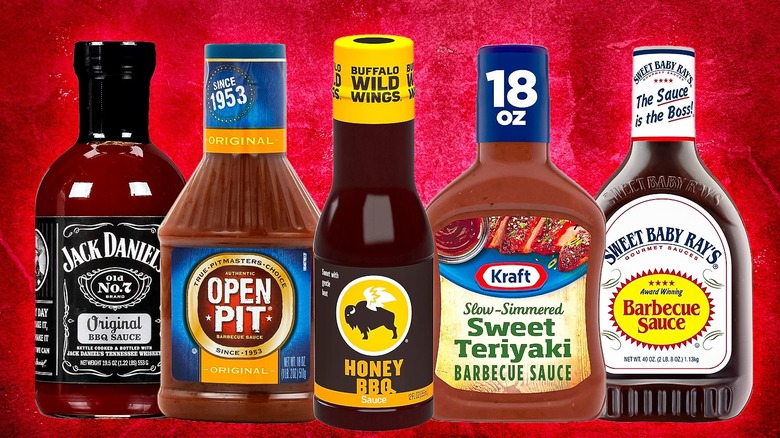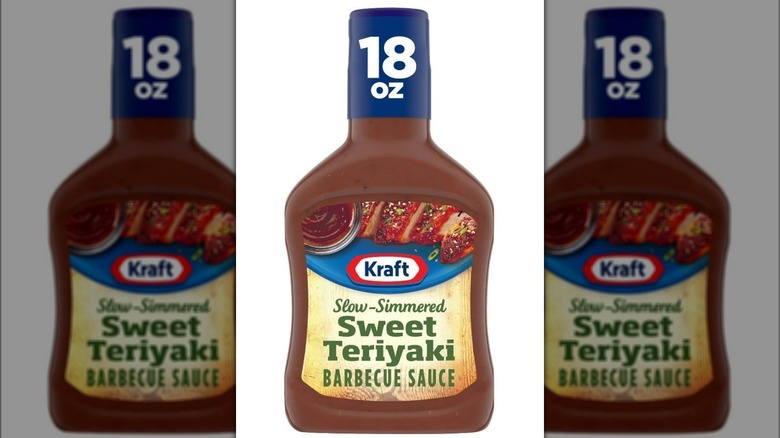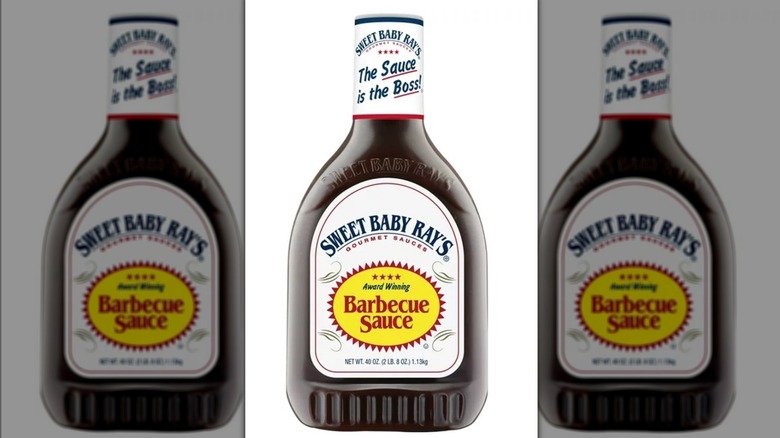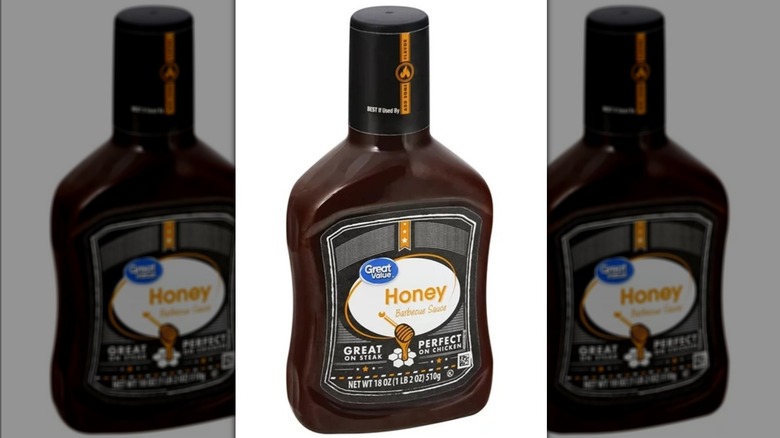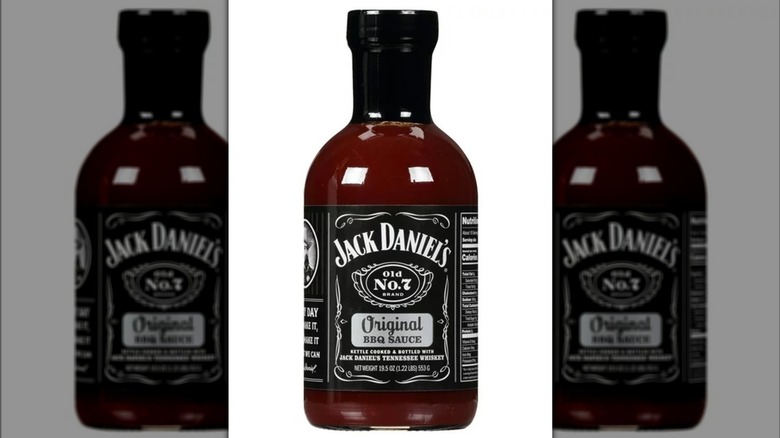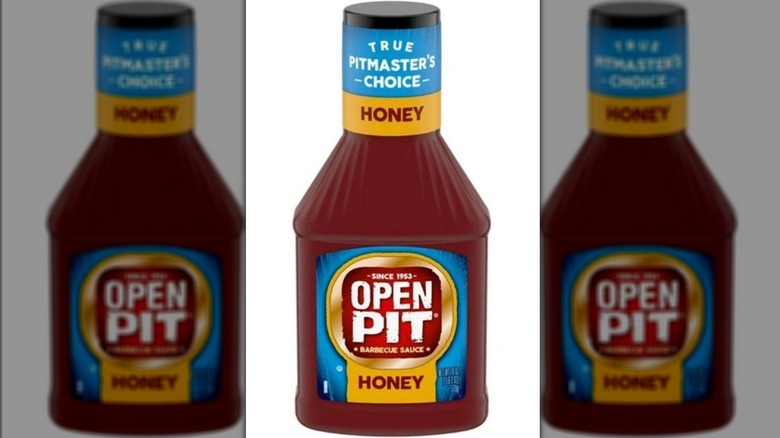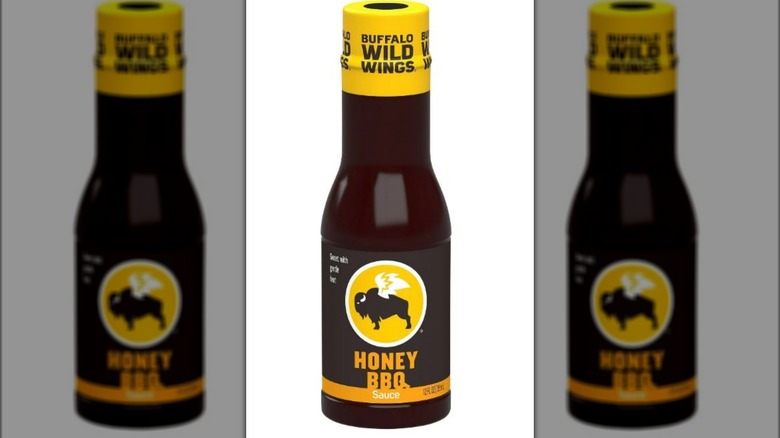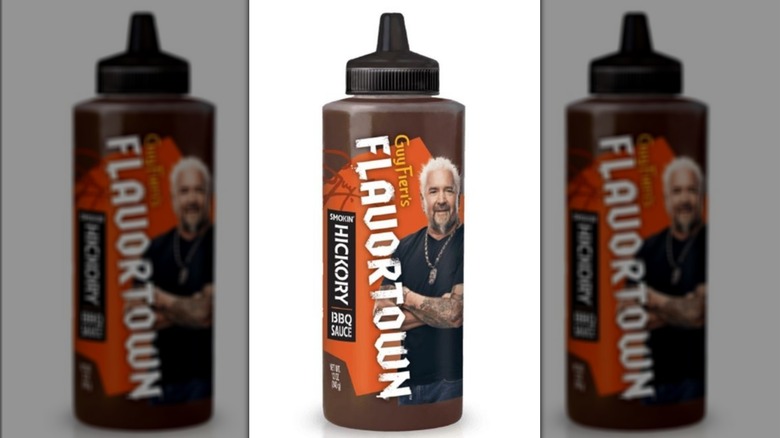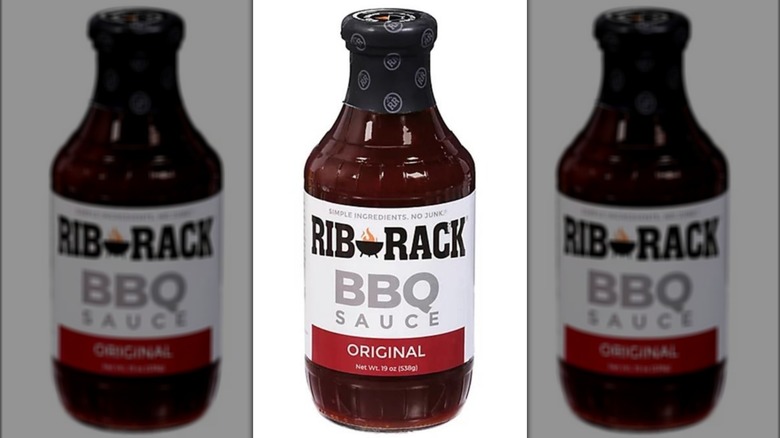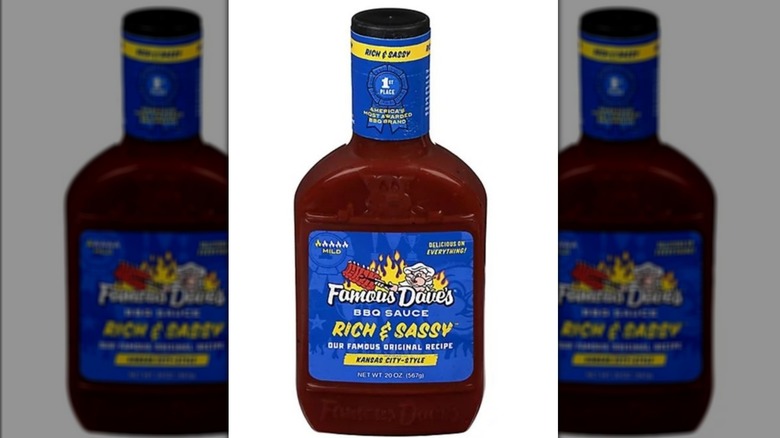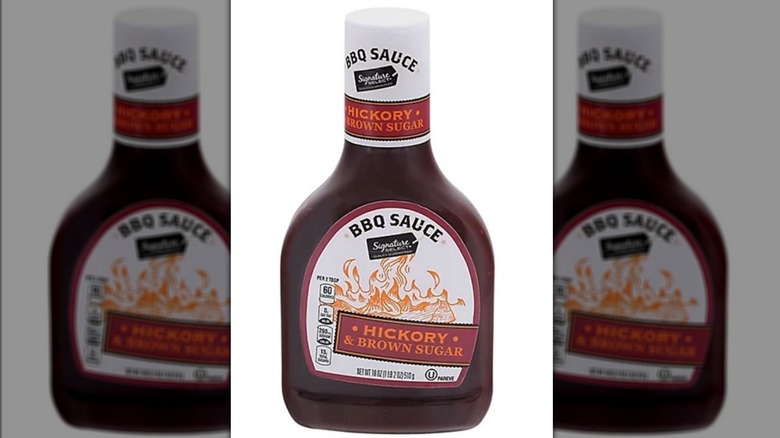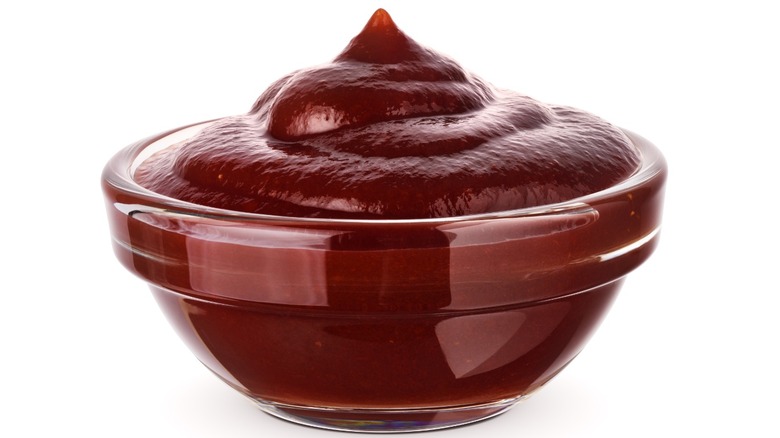10 Barbecue Sauces With An Unhealthy Amount Of Sugar
We may receive a commission on purchases made from links.
It's all too tempting to swath your chicken and ribs in a bottle of store-bought barbecue sauce to infuse your favorites with as much smoky flavor as possible. This isn't a cuisine designed for holding back; any grill masters worth their flipper will tell you the more sauce you add, the better your dish tastes. But even the best brands of barbecue sauce are likely to include unhealthy ingredients in the recipe, usually in the form of sugar designed to heighten the experience even further. This is bad news for mindful eaters looking for tasty options that don't soak their chops in troublesome sweeteners.
It's crucial to know what you're pouring on your pulled pork or shredded beef before you overload your culinary masterpieces with more sugar than your system can handle. We scanned the labels of popular store-bought barbecue sauces to see which bottles toss in the most problematic ingredients. Unsurprisingly, the most frequent offender is high fructose corn syrup, a devious form of sugar found in more processed foods than you can shake a St. Louis drumstick at. But some concoctions go further, using multiple forms of sugar to achieve their flavor, be it creatively distinctive or disappointingly derivative. Grab a fork and dig into the results to find out whether you should consider rethinking your go-to store-bought barbecue sauce.
Kraft Sweet Teriyaki Slow-Simmered barbecue sauce
You may find it difficult to resist the call of an Asian-style grocery store barbecue sauce flavor like Kraft Sweet Teriyaki Slow-Simmered, especially on nights when short ribs are part of your dining plans at home. It's different enough from the other options to make you look twice and wonder whether it's easier to buy bottled than whip up your own teriyaki sauce. And having a one-time purchase leaves the bottle in your fridge for future use ... like saucing up leftovers for a take-to-work lunch the next day.
Knowing you'll be zapped with 12 grams of sugar per two-tablespoon serving might make you think twice about this brand of teriyaki sauce. Your home recipe may include brown sugar, molasses, or both, but it isn't likely to include high fructose corn syrup, an artificial sugar that has been associated with an increased risk of health issues, ranging from obesity to fatty liver disease to diabetes. With sugar and pineapple juice in Kraft's concoction, why would the company add even more liquid sweetener to make the teriyaki connection? You're better off taking the extra time to create a more healthful version that lets you control the sugar content.
Sweet Baby Ray's Original barbecue sauce
Sweet Baby Ray's Original offers the right blend of sweet and spicy for giving your backyard barbecue a flavorful lift, no matter what you slap it on. It's the patriarch of the whole sauce line, the head of the household that sets a standard that the other flavors take their lead from. But they don't call it "Sweet" Baby Ray's for nothing, even if it originated as a nostalgic basketball-playing nickname for the brother of the man who started the company decades ago. The recipe also revels in its sweetness as a layer that's essential to the barbecue business.
In this case, the sweet goes overboard and does a real number on the nutritional possibilities of bottled sauce. You'll get a stunning 17 grams of sugar in two tablespoons here, if you can limit yourself to a single serving. Good ol' high fructose corn syrup leads the sweetener parade as the sauce's main ingredient, followed close by its equally overused sibling corn syrup. If two different sugars aren't enough to shake you to the bone, there's also pineapple juice concentrate, sugar, and molasses. And if the idea of unidentified "natural" flavor makes your stomach leap a little, then you should probably give Sweet Baby Ray's barbecue sauce wide berth and steer clear.
Great Value Honey barbecue sauce
Walmart makes it easy to afford your cookout with its Great Value Honey barbecue sauce, but that doesn't mean it adheres to high nutritional standards. Yes, the name does suggest that natural honey is the only sweetener required to achieve a classic Texas-style sauce to give your spread a saucy sheen. But factory-produced food rarely adheres to the basics when recreating established flavor blends, and Great Value falls right in line with that practice.
The 12 grams of sugar found in a serving of this discount squeeze comes from a combination of high fructose corn syrup, molasses, and honey, stripping away any hopes of maintaining a neutral state where nutrition is concerned. The fact that honey is the last of the three to appear on the label means the unhealthy ingredients do the heavy lifting, and the honey adds its floral notes while allowing its name to be used on the label. Not cool, Great Value. Think twice before buying this barbecue sauce, despite its enticing bargain price point.
Jack Daniel's barbecue sauce
When one of America's premier whiskey providers sets its sights on the world of barbecue sauce, you know the results are going to be smoky and flavorful. Jack Daniel's turns out a high-powered gourmet grilling lotion that includes actual whiskey in the formula. It's unlikely to be enough to cause health issues, but this is a collection of the unhealthiest store-bought barbecue sauces, and we would be remiss if we didn't call out this ingredient while looking for other offenders. Whiskey may be a soothing sip straight up, on the rocks, or in a cocktail, but it's no one's idea of a fitness beverage.
Beyond the premium pour in the bottle, Jackie D.'s also lays on the sweet talk in a way that might work to balance out the whiskey notes but feels excessive if you're watching your sugar intake. The triple-play of cane sugar, molasses, and pineapple juice concentrate is no high fructose situation, to be sure. But with 15 grams of sugar per serving, these ingredients are considerable for a product that shouldn't require a spoonful or more of sugar to make the medicine go down. Barbecue is sort of like medicine all on its own. It may sound like a barbecue sauce to try at your next cookout, but dousing the goods in gooey glaze that punches you in the pancreas is just asking for trouble.
Open Pit Honey barbecue sauce
Open Pit is no newcomer to the bottled barbecue sauce scene. It's been around since debuting in Detroit in 1953, helping home chefs jazz up their sausage links and burnt ends with a thick and luscious sauce. In addition to the original flavors, the company offers a blue label collection called Pitmaster's Choice, a premium option that blends vinegar tang with sweetness and spice for a unique brush-on that aims for complexity. But nutrition is sacrificed in an effort to be high-falutin' and gourmet, and consumers are the ones who pay the price twice — once at the grocery store and once at the dinner table.
While the 9 grams of sugar per serving isn't the worst we've seen out there, it comes from a blend of high fructose corn syrup and honey, which complicates the nutritional profile from the get-go. The ingredients list also has hydrolized corn and soy proteins – predecessors to monosodium glutamate (MSG) — that are presumably used for flavor enhancement that could cause unpleasant side effects in sensitive individuals. If that isn't enough, Open Pit Honey barbecue sauce also uses artificial dyes in the form of red 40, which may worsen ADHD symptoms in children; yellow 5, which can disrupt sleep patterns; and blue 1, which may cause allergic reactions. If nutrition in your barbecue sauce is a concern, close the lid on Open Pit.
Buffalo Wild Wings Honey barbecue sauce
How cool is it that you can capture the excitement of Buffalo Wild Wings Honey barbecue sauce at home without having to dial up DoorDash? You can dip it on any kind of wings you like as well as use it as a fry sauce or Southwestern taco sprucer-upper. You could even transform this sauce into salad dressing if you want to get fancy about it. And all of it comes without added fees or tips for the driver, leaving you extra money to pour into your grill-out so you can share the good times with the crew.
Nutritionally speaking, however, the restaurant chain's home version should cause some hesitation. Honey would be enough of a nectar to crank the smoothness of a barbecue sauce to its ultimate limits. But Buffalo Wild Wings Honey barbecue sauce seems to have lost the thread on just how efficient a nature-based sweetener like honey is. How else can the brand explain the inclusion of high fructose corn syrup as the leading ingredient on the back-label rundown? Why not just stir in a handful of melted gummy bears instead? With honey, corn syrup, and sugar also swirled into the brew, you're getting 14 grams of sugar per serving. Yikes. If you thought "honey" on the label meant only honey, you've been Buffaloed.
Flavortown Smokin' Hickory barbecue sauce
Celebrity chef Guy Fieri sure knows how to get folks fired up for a cookout, and his Flavortown Smokin' Hickory barbecue sauce is part of the process. This slick grilling juice pumps a ton of flavor into a squeeze bottle, pairing traditional barbecue sauce flavorings with a hearty helping of Worcestershire to give body and complexity to the mix. Pitmasters of all skill levels can pass themselves off as pros with such a sauce soaking their shredded chicken and succulent brisket, but that kind of achievement always comes at a cost.
Any time you add sauce to sauce, you double the ingredients and risk making things stickier nutrition-wise. This holds true with Smokin' Hickory, which dials in a tongue-tingling 17 grams of sugar per serving. We found it on the label in the forms of sugar, molasses, and brown sugar as part of the barbecue sauce base and then again as molasses and sugar in the Worcestershire sauce sub-listing. The sauce also has pineapple juice concentrate, a usual suspect in the barbecue sauce sweetening ring and a great way for pineapple farmers to make a ton of cash. For the sake of your health, make a beeline out of Flavortown and keep your sugar in check.
Rib Rack Original barbecue sauce
Rib Rack digs right into a claim of using "no junk" ingredients in its recipes in oversized letters on its website landing page as well as at the top of the label on each bottle. And it's true; Rib Rack Original barbecue sauce is a deluxe pour-on that uses only ingredients you can pronounce and recognize, a grand achievement in a world of factory processing and unfamiliar add-ins that read more like a magic spell than a recipe for barbecue sauce. We found only nine ingredients on the label in total, which should put ease in the hearts of backyard burger flippers who favor a more natural form of flavoring in their grilling game.
Sadly, two of the nine ingredients are brown sugar and molasses, which provide 14 grams of sugar in a single serving that takes the sheen off the natural goodness overall. It's surprising that a more thoughtful company like Rib Rack didn't lean more toward the smoky or spicy end of the flavor spectrum to compensate for using less sugar than the other brands. At least there's no corn syrup here, even if there is more sugar than you may want your dinner guests to pile onto their plates.
Famous Dave's Rich & Sassy barbecue sauce
Famous Dave's Rich & Sassy barbecue sauce makes it simple to offer the neighbors some top-notch table-toppers, similar to what they might enjoy at a Famous Dave's restaurant. This shake-and-bake version of the original Kansas City formula captures the sprightly spirit you'll find in the dishes on the chain's mouthwatering menu. You might even find yourself inventing new uses so you can lend this powerful preparation to as many dishes as possible.
But the bitter truth about Famous Dave's is that you'd be short-changing yourself nutritionally if you let things go that far. The recipe is sophisticated for a bottled barbecue baste, featuring barley gluten to make matters tricky for the gluten-sensitive as well as hydrolized soy protein to mess up the barbecue enjoyment of eaters who might have soy allergies. And then, there's the 13 grams of sugar per serving, arising from a by-now familiar quartet of high fructose corn syrup, pineapple juice concentrate, molasses, and honey. Maybe Famous Dave's should go incognito at the cookout in favor of a more healthful sauce.
Signature Select Hickory & Brown Sugar barbecue sauce
Albertsons makes no bones about what's in its store-brand bottle, calling out the sweet stuff in the name of its barbecue sauce: Signature Select Hickory & Brown Sugar. This makes it much easier to sidestep a more syrupy take on barbecue sauce without having to peep at the label. But what if you wanted to know more about what gives this brown sugar-based slather for your beans and burnt ends its essential tasting notes? Wouldn't you expect to see brown sugar at the top of the recipe? You wouldn't be wrong if you assumed that. Why use the word in a product name if it isn't featured as the main ingredient?
It's a good question and maybe one Albertsons could answer for its shoppers, since the first item listed on the back panel is high fructose corn syrup with brown sugar listed later – at least we know it's part of the package. There's a whole hit parade of other sweeteners too, including pineapple juice concentrate plus the trio of molasses, corn syrup and sugar as part of the sub-recipe for the Worcestershire sauce that flavors the brew. That's a whopping six different kinds of sugar-based additives included in the sauce to deliver 13 grams of sugar per serving. We also spied sulfites on the list, a huge "no" when it comes to nutrition. This combination makes Signature Select a sauce to let slide by.
How we chose our sauces
Sugar was our key consideration among unhealthy ingredients that make bottled barbecue sauce a troubling condiment. While most barbecue sauces consider two tablespoons a serving size, the idea that barbecue diners are able to limit the amount of sauce consumed when it's mixed into a recipe makes it almost impossible to predict how much is actually being eaten. So getting an average of 12 grams of sugar in a serving multiplied by two or more means you could easily eat a day's worth of the recommended amount of sugar in a single pulled pork sandwich.
We were also on the lookout for strange additives like preservatives and thickeners that can make trouble for your cookout. While most of the selections we saw steered clear of ingredients like guar gum and carrageenan, we did find at least one culprit with artificial dyes present in the formula as well as one with sulfites, a preservative used in cured meats that's on the processed foods' "best to avoid" list. This seems an odd strategy, considering everything in the bottle defaults to reddish-brown for all the other brands without dyes of any kind. Regardless of the reasoning, it's another factor that adds to the unhealthiness of some store-bought barbecue sauce brands, and one that can be worked around easily with a glance at the label.
